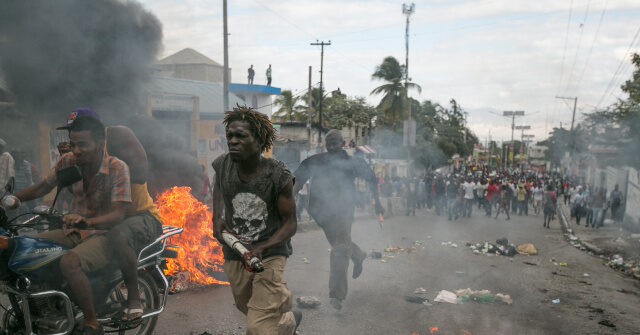On October 3, a horrific incident unfolded in Haiti’s rural town of Pont-Sondé as gang violence erupted, resulting in the deaths of over 88 people amid a significant absence of the elite anti-gang police forces. While the streets were filled with chaos and bodies, many Haitian police officers had fled the country, leaving behind a vacuum in law enforcement. According to the U.S. Department of State’s “2024 Trafficking in Persons Report: Haiti,” approximately 3,000 police officers left since 2022 under immigration processes facilitated by the Biden administration, particularly through humanitarian parole programs designed for Cubans, Haitians, Nicaraguans, and Venezuelans. Many of these former officers found themselves in low-wage jobs within the United States, highlighting a troubling disconnect between the dire situation in Haiti and the experiences of those who sought refuge abroad.
The New York Times captured the chaos that ensued when the police arrived hours after the massacre, with witnesses describing scenes of desperation and fear. High-profile gangs like Gran Grif perpetrated the violence while the police remained largely ineffective, illustrating how the elite in Haiti reportedly prioritizing their own interests rather than taking substantial action against gang activities. The Haitian police, which has seen significant attrition, has been described by these ex-officers as “sick to the bone,” lacking a real motive to tackle the ongoing crisis. They pointed to a system riddled with corruption and indifference from the government as a significant barrier to any meaningful advancements against crime.
The situation in Haiti reflects a broader pattern of what has been termed “Extraction Migration.” The implementation of policies by U.S. immigration officials, particularly Alejandro Mayorkas, has led to the mass exodus of educated and skilled Haitians. Migrants have utilized Temporary Protected Status and humanitarian parole to escape dangerous conditions, but the repercussions for Haiti are severe. The exodus has resulted in the severe depletion of Haiti’s workforce across various sectors, including healthcare and education, where a staggering percentage of professionals have sought opportunities outside the country, leaving critical gaps in these fundamental services.
Among those who have migrated, numerous former police officers have recounted their struggles in adapting to life in the United States. Various accounts highlight how their skills if recognized at all, have been devalued as they take on low-wage positions rather than utilizing their expertise in public safety. Ex-officers have expressed feelings of disillusionment regarding the Haitian police force itself, emphasizing the stark contrast between their past dedication to service and their current roles far removed from law enforcement. Their stories underscore a critical issue: the loss of human capital in Haiti greatly hampers the country’s ability to rebuild a stable and democratic society.
The perspective of the U.S. government through officials like Mayorkas shows a troubling trend when it prioritizes labor needs in the United States over addressing the humanitarian crisis in Haiti. His statements suggest an ongoing commitment to providing avenues for migration without offering solutions to the root problems causing such dislocation. Critics, including various scholars and local officials, have described this as a brain drain—an outflow of talent that will ultimately impede Haiti’s chances of recovery. As educated individuals flee in search of better prospects, the remaining communities are left in precarious positions with no clear path forward.
Despite the ongoing turmoil in Haiti, U.S. immigration policy remains primarily concerned with migration as a means of bolstering the American workforce rather than focusing on stabilization efforts for the country. The solution proposed by some analysts involves either rebuilding Haiti to foster job creation or accepting an indefinite outflow of its citizens as a labor source. This dilemma illustrates an unwillingness to genuinely engage with the complexities of Haiti’s sociopolitical landscape. The divide between the immigration policies of the U.S. and the dire conditions in Haiti raises important questions about international responsibility and the obligation to assist rather than merely extract resources, allowing a systemic crisis to persist for millions still struggling in their homeland.

